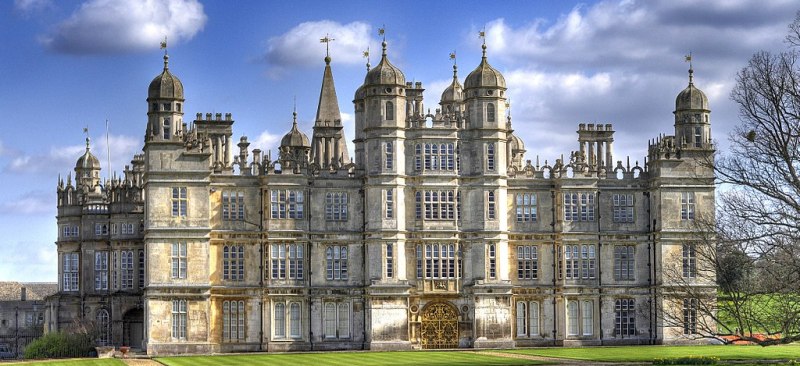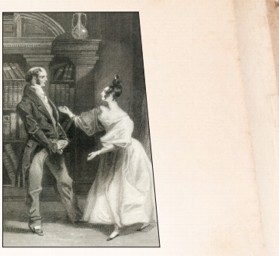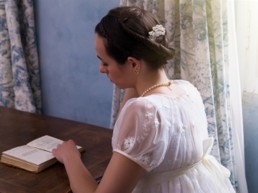
Think about the following questions.
1. Do you believe that “love conquers all"?
2. Do you think family and other social considerations are important when deciding whom to marry?
3. Is it appropriate to judge others based on their social status? How else might a person be judged?
VOCABULARY PREVIEW
Match each New Academic Word List(NAWL) word with the correct definition.
- admission _____
- inferiority _____
- evident _____
- disturbance _____
- duration _____
- unconsciously _____
- a. without being aware
- b. the period of time during which something lasts
- c. the act of confessing something
- d. the state of being lower in rank or quality
- e. obvious
- f. the state of being disturbed; the act of disturbing
PRIDE AND PREJUDICE BY JANE AUSTEN

Elizabeth was suddenly roused1 by the sound of the doorbell, and her spirits were a little fluttered by the idea of its being Colonel Fitzwilliam himself. He had once before called late in the evening and might now again have come to inquire particularly after her. But this idea was soon banished2, and her spirits were very differently affected when, to her utter amazement, she saw Mr. Darcy walk into the room. In a hurried manner, he immediately began an inquiry after her health, imputing his visit to a wish of hearing if she felt better. She answered him with cold civility. He sat down for a few moments, then got up and walked around the room, which surprised Elizabeth, who said nothing.
After a silence of several minutes, he came toward her in an agitated manner and said, “In vain I have struggled, and it will not do. My feelings will not be repressed3, and you must allow me to tell you how ardently4 I admire and love you."
Elizabeth's astonishment at his admission was so great that she stared, colored5, doubted, and was silent. Darcy considered this sufficient encouragement; and so, he continued to tell her all he felt and had long felt for her. He spoke well, but there were feelings besides those of the heart that he detailed. And he was not more eloquent on the subject of tenderness than of pride. He dwelt on his sense of her inferiority, and also on the family obstacles which stood in their way, and told her that his better judgment had wrestled with his feelings.
In spite of her deeply rooted dislike for Darcy, Elizabeth could not be insensible6 to the compliment of such a powerful man's affection, and though her intentions did not vary for an instant, she was sorry for the pain he was about to receive until, roused to resentment by his insensitive words, she lost her compassion and became angry. She tried, however, to compose herself to answer him patiently, once he had finished talking.
He concluded by telling her of the strength of his love for her, which, in spite of all his endeavors7, he had found impossible to conquer, and with his expression of hope that it would now be rewarded by her acceptance of his hand in marriage. As he said this, she could easily see that he had no doubt that she would answer affirmatively. He spoke of apprehension and anxiety, but his countenance8 expressed real security that she would accept him.
This further exasperated her, and when he ceased talking, the color rose into her cheeks and she said, "In such cases as this, it is, I believe, the established mode to express a sense of obligation for the sentiments avowed, however unequally they may be returned. It is natural that obligation should be felt, and if I could feel gratitude I would now thank you. But I cannot - I have never desired your good opinion, and you have certainly bestowed9 it most unwillingly. I am sorry to have caused you pain. It has been most unconsciously done and, I hope, will be of short duration. These feelings, which, you tell me, have long prevented the acknowledgment of your regard, will surely help you overcome your love for me, especially after what you have expressed as your true opinions of me and my family."
Mr. Darcy, who was leaning against the mantelpiece10 with his eyes fixed on her face, seemed to catch her words with both resentment and surprise. His complexion became pale with anger, and the disturbance of his mind was visible in every feature. He was struggling for the appearance of composure11 and would not open his lips till he believed himself to have attained it.
The pause made Elizabeth feel dreadful, and at length, with a voice full of forced calmness, he said, "And this is all the reply which I am to have the honor of expecting! I might, perhaps, wish to be informed why, with so little endeavor at civility, I am thus rejected. But it is of small importance.”
"I might as well inquire,” replied she, "why with so evident a desire of offending and insulting me, you chose to tell me that you liked me against your will, against your reason, and even against your character."
New Academic Word List
- rouse 1 : v. to awaken or excite into action
- banish 2 : v. to expel; to send or drive away
- repress 3 : v. to hold in by self-control
- ardently 4 : adv. with great warmth of feeling
- color 5 : v. to blush
- insensible 6 : adj. unaware of; unmindful
- endeavor 7 : n. an effort; an attempt
- countenance8 : n. expression of the face
- bestow 9 : v. to give something as a gift or an honor
- mantelpiece 10 : n. the shelf above a fireplace
- composure11 : n. self-possession and control of emotions
READING COMPREHENSION
A ‣ Mark each statement as true (T) or false (F) according to the reading.
- Elizabeth was hoping that it was Mr. Darcy at the door.
- True
- False
- Based on her thoughts, it is clear the Elizabeth respects and admires Mr. Darcy.
- True
- False
- Mr. Darcy feels superior to Elizabeth and her family.
- True
- False
- Mr. Darcy was expecting Elizabeth to reject his proposal.
- True
- False
- Elizabeth refuses Mr. Darcy because she feels that he is too good for her.
- True
- False
B ‣ Choose the best answer according to the reading.
- What is the excerpt mainly about?
- a. Elizabeth's hatred of Mr. Darcy
- b. Mr. Darcy's arrogant assessment of Elizabeth
- c. Elizabeth's rejection of Mr. Darcy's marriage proposal
- d. How Elizabeth and Mr. Darcy try to disguise their feelings
- Why did Elizabeth think that it would be Colonel Fitzwilliam at the door?
- a. Because he had come to her house at the same time on a previous occasion
- b. Because he had called her to let her know that he would be stopping by
- c. Because he usually visited her at this time
- d. Because he was her husband, and she was expecting him to come home
- The word civility in paragraph 1 is closest in meaning to _____.
- a. politeness
- b. obligation
- c. respect
- d. surprise
- It can be inferred from paragraphs 7 and 8 that Mr. Darcy _____.
- a. was not really surprised by her answer
- b. did not really care either way how she replied
- c. was not aware how rude and insensitive he was being
- d. was relieved because he had been forced by social pressure to ask
C ‣ Fill in the blanks with information from the reading.
- After Mr. Darcy first entered and asked about Elizabeth's health, there was _____.
- Elizabeth's main emotion at the moment when Mr. Darcy proposed marriage was ____.
- Even though she disliked him, Elizabeth considered his proposal to be a ____ because he was so powerful.
SUMMARY
An introductory sentence for a brief summary of the passage is given below. Choose three more sentences to complete the summary.
First Sentence: Mr. Darcy arrived at Elizabeth's door and pretended he was there to ask about her health.
-
- 1 Elizabeth rejected his proposal, and Mr. Darcy stood silent at first, sincerely surprised and offended by her answer.
- 2 Elizabeth listened to Mr. Darcy's kind sentiments, and as she did so, she could imagine the wonderful life they would have together.
- 3 Darcy then professed his love for her, but Elizabeth grew upset because he spoke less of love than of pride and her inferiority to him.
- 4 As Mr. Darcy continued, his disrespect for her and her family made her angry, which turned to surprise when he asked her to marry him, confident that she would say yes.
- 5 After leaving her house, Mr. Darcy proceeded to his family home to discuss the night's events.
- 6 Mr. Darcy's remarks about her family made Elizabeth feel ashamed, and she apologized for their behavior.
VOCABULARY PRACTICE
Fill in the blanks with the words in the box. Change the form if necessary.
- admission
- disturbance
- duration
- inferiority
- evident
- unconsciously
- Some very good restaurants are inexpensive, so don't assume that a low price is a sign of _____ .
- Painful experiences in childhood may lead to lasting emotional _____ .
- Everyone was shocked by Nicole's _____ that she had stolen the money.
- My little brother cried for the entire _____ of the car ride to Grandma's house.
- There are certain actions that people do _____ all the time, such as breathing, blinking, and swallowing.
- Although the guests complimented their host enthusiastically, their true feelings about the food became _____ when they failed to finish it.
SUPPLEMENTAL READING
Did Jane Austen Ever Fall in Love?

There is not a lot of detailed biographical information available about Jane Austen. This is largely because, after her death at the age of forty-two from Hodgkin's disease in 1817, many of the letters she wrote to friends and loved ones were burned by her family. The letters were probably destroyed to protect Austen's reputation and privacy. The fact that she never married, despite writing so much on the subject of love, has kept fans curious about Austen's romantic experiences.
Though it has never been proven, many suspect that Austen did have at least one passionate love affair during her relatively short life. In 1795, when she was twenty, a young law student from Ireland named Tom Lefroy came to stay with some relatives of his who lived near the Austen family. No one knows exactly how and where he and Jane met, but it is documented that they spent considerable time together. There is also a good chance that they developed feelings for one another.
Sadly, it was not practical for the couple to marry since neither of them had any money. Lefroy was dependent on a wealthy uncle to finance his continued education. Consequently, his family sent him away in January 1796, and he and Jane are not known to have met again. That year, Austen began working on the novel that was eventually published as Pride and Prejudice in 1813. Some believe her personal experiences may have influenced the novel's plot, and some critics speculate that Lefroy may have been Austen's model for the character of Darcy.
Fill in the blanks with information from the reading.
- Austen's family probably burned her letters to protect her _____ .
- If Austen and Lefroy did actually want to marry, they couldn't do so because neither had _____ .
- Austen began working on her novel _____ the same year she and Lefroy apparently ended their relationship.

Leave a comment
Load more